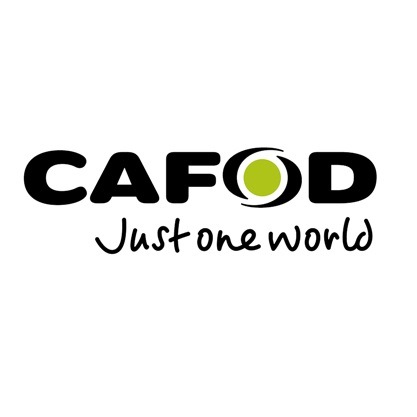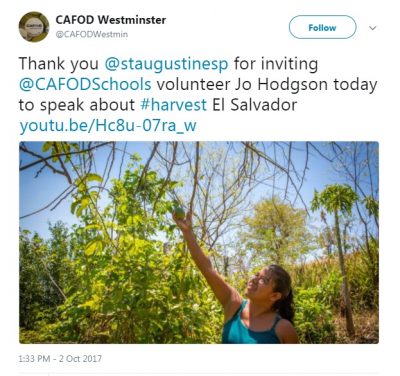It may be incomplete, but it is a beginning, a step along the way.
We welcomed CAFOD Schools Speaker, Jo Hodgson, on the morning of Monday 6th October to teach the whole school about CAFOD’s work and Harvest Fast Day this coming Friday. Ms Hodgson showed us a video documenting the day-to-day life of Sister Cruz in El Salvador where many people live in poverty and there is ongoing violence. Sister Cruz runs groups for young people to help to build their self-confidence through activities, and to share and discuss their experiences. The groups support children who are often exposed to gang culture and crime, and they learn about peace in order to pass this knowledge onto their families with the hope of creating a brighter future.
We learned about the ways in which our money can help families in El Salvador; £1 can fund a child’s attendance at a club where they can be safe, £58 would provide a family with the materials to grow their own crops, and £123 would help a family to start a business such as chicken farming. This Friday 6th October is Harvest Fast Day – the school will be providing soup for lunch, and donating the money saved to CAFOD.
Ms Hodgson spoke about Blessed Oscar Romero, Archbishop of San Salvador, who was assassinated in 1980, and asked us to reflect on the following words, ‘A Step along the Way’, which are often attributed to him,
“It helps, now and then, to step back and take a long view.
The kingdom is not only beyond our efforts, it is even beyond our vision.
We accomplish in our lifetime only a tiny fraction of the magnificent
enterprise that is God’s work. Nothing we do is complete, which is a way of
saying that the Kingdom always lies beyond us.
No statement says all that could be said.
No prayer fully expresses our faith.
No confession brings perfection.
No pastoral visit brings wholeness.
No program accomplishes the Church’s mission.
No set of goals and objectives includes everything.
This is what we are about.
We plant the seeds that one day will grow.
We water seeds already planted, knowing that they hold future promise.
We lay foundations that will need further development.
We provide yeast that produces far beyond our capabilities.
We cannot do everything, and there is a sense of liberation in realizing that.
This enables us to do something, and to do it very well.
It may be incomplete, but it is a beginning, a step along the way, an
opportunity for the Lord’s grace to enter and do the rest.
We may never see the end results, but that is the difference between the master
builder and the worker.
We are workers, not master builders; ministers, not messiahs.
We are prophets of a future not our own.”





